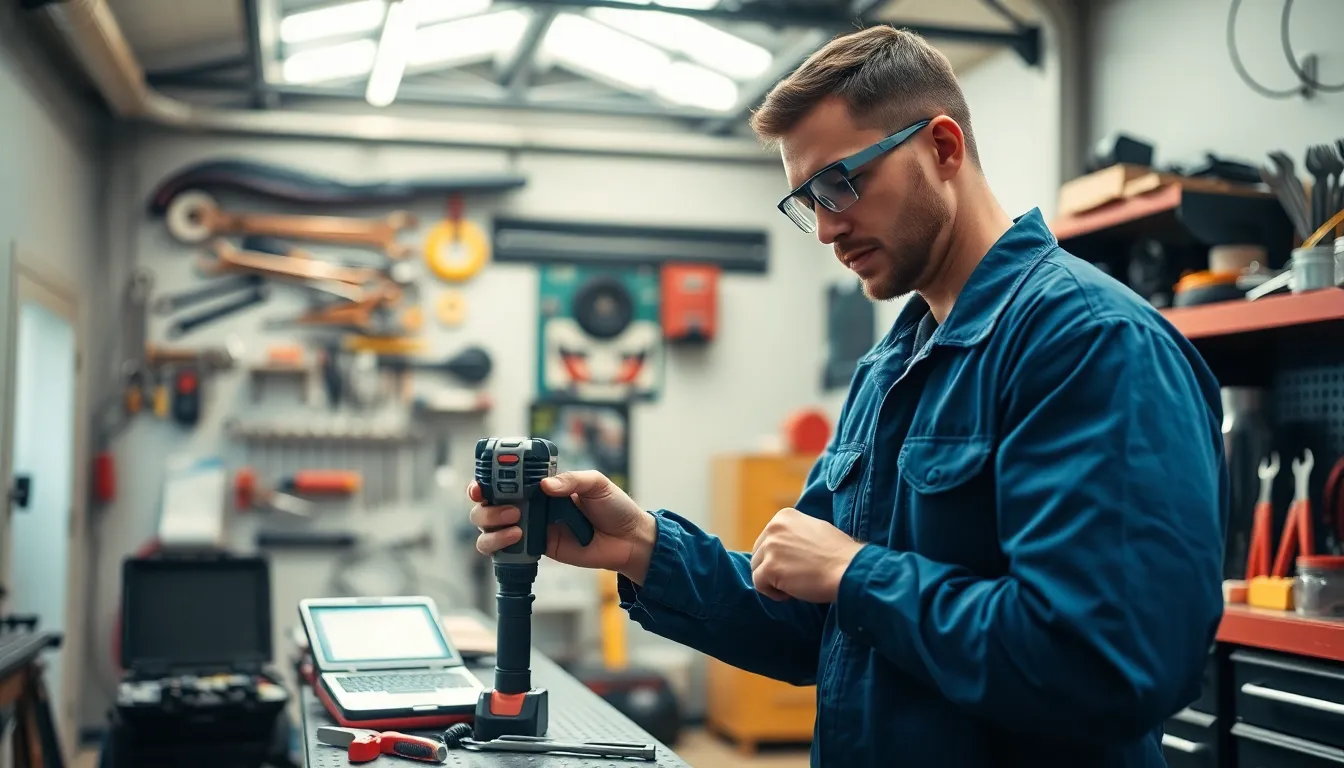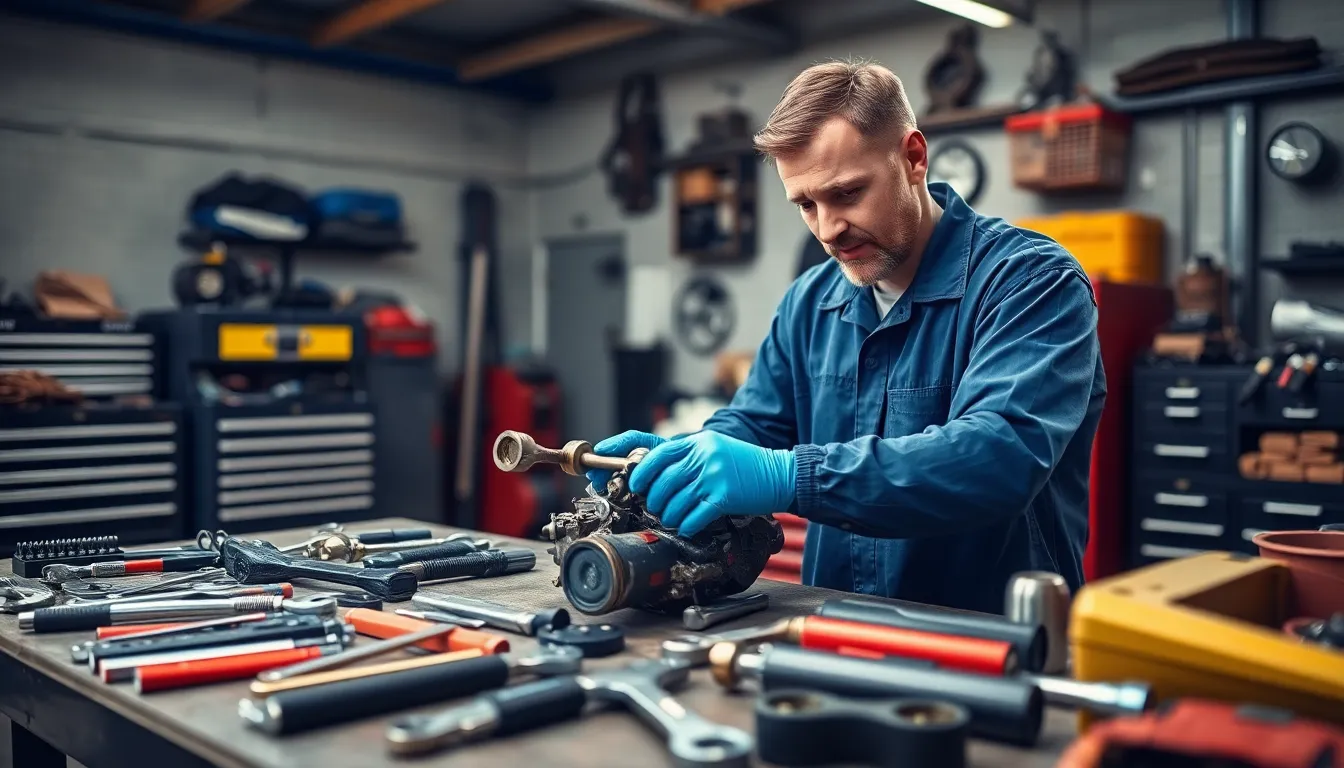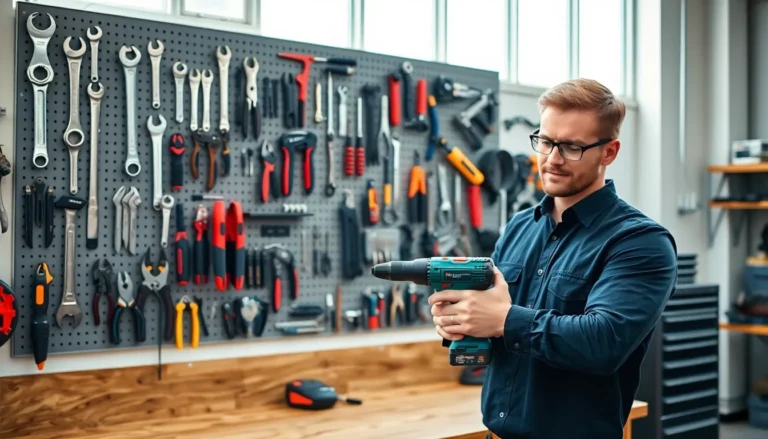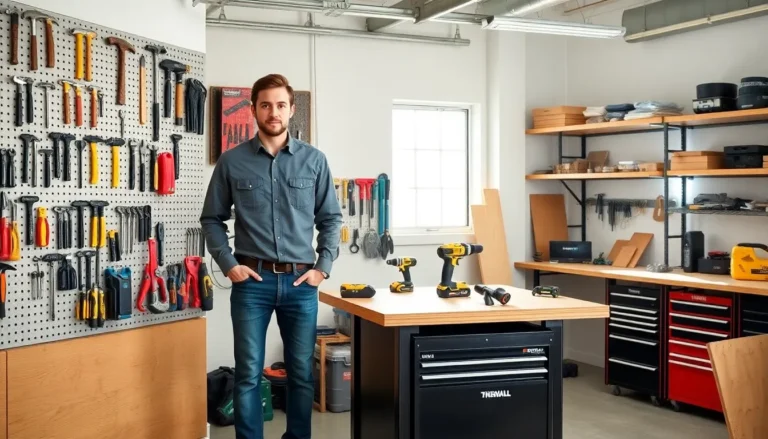Every car owner knows that when trouble strikes, it’s not just the engine that needs fixing—it’s also the toolbox. Mechanic tools are the unsung heroes of the garage, transforming a simple oil change into a heroic rescue mission. Without the right tools, even the most experienced mechanic might as well be trying to perform surgery with a spoon.
Imagine trying to tackle a stubborn bolt with nothing but a pair of pliers. It’s like bringing a rubber chicken to a knife fight. The right mechanic tools not only make the job easier but also ensure that the car runs smoother than a jazz saxophonist on a Saturday night. So whether you’re a DIY enthusiast or a seasoned pro, investing in quality tools is the key to unlocking a world of automotive possibilities. Let’s dive into the essential mechanic tools that’ll have you saying, “I can fix that!” in no time.
Table of Contents
ToggleOverview of Mechanic Tools
Mechanic tools play a vital role in vehicle maintenance and repairs. Essential tools include wrenches, sockets, and screwdrivers. Each type offers specific functions that facilitate various automotive tasks. For instance, wrenches provide leverage for loosening or tightening bolts, while sockets allow for better access to fasteners in tight spaces.
Power tools also enhance efficiency. Impact wrenches significantly decrease the time taken to remove lug nuts. Similarly, pneumatic tools offer speed and ease when dealing with stubborn components. Hand tools remain invaluable for precision work, allowing mechanics to have better control during tasks.
Quality matters when selecting mechanic tools. High-quality tools often endure wear and tear better than their cheaper counterparts. Investing in reputable brands can lead to long-term reliability and performance. Mechanics often prioritize tools that offer ergonomic designs to reduce fatigue during prolonged use.
Storage solutions, such as toolboxes and tool chests, organize these important instruments. A well-organized workspace promotes productivity and minimizes time spent searching for tools. Proper maintenance of tools also extends their lifespan. Regular cleaning and appropriate storage can prevent rust and damage.
Mechanic tools enable both enthusiasts and professionals to tackle repairs confidently. Investing in a solid collection makes various tasks manageable, from routine maintenance to complex repairs. They serve not only as tools but also as enablers of skill development in automotive work.
Types of Mechanic Tools

Mechanic tools come in various categories, each tailored for specific tasks in automotive maintenance and repair. Understanding these tools enhances the efficiency and effectiveness of any mechanic’s work.
Hand Tools
Hand tools play a vital role in everyday repairs. Wrenches facilitate tightening and loosening bolts and nuts. Screwdrivers come in different sizes and types, essential for fastening or removing screws. Pliers allow for gripping, twisting, and cutting wires. Measuring tools ensure accuracy in adjustments. These tools are straightforward to use and require no external power source, contributing to their popularity among DIY enthusiasts and professionals.
Power Tools
Power tools accelerate the repair process significantly. Impact wrenches provide high torque outputs, making them perfect for removing stubborn bolts. Pneumatic tools, powered by compressed air, offer speed and efficiency for various tasks. Electric drills assist in drilling holes or driving screws effortlessly. Including these tools in a mechanic’s toolbox boosts productivity and reduces manual labor, helping to tackle complex jobs more quickly.
Specialty Tools
Specialty tools serve unique functions that standard tools may not address. Diagnostic scanners read vehicle codes to identify issues accurately. Torque wrenches ensure precise tightening of fasteners, which is crucial for engine assembly. Brake tools assist in servicing braking systems without damaging components. Using specialty tools not only enhances repair quality but also fosters skill development in handling specific automotive challenges.
Essential Mechanic Tools for Beginners
Selecting the right mechanic tools is crucial for any beginner looking to dive into automotive work. A solid toolkit enhances repair efficiency and ensures tasks are completed correctly.
Basic Hand Tools
Wrenches come in various sizes and types, including open-end, box-end, and adjustable wrenches. Each serves a specific purpose, catering to different fastener types. Screwdrivers, including Phillips and flathead varieties, are indispensable for removing or securing screws. Pliers add versatility, allowing for gripping, twisting, and cutting tasks. A reliable set of sockets and ratchets complements these essentials, providing ease for loosening or tightening bolts. Finally, a torque wrench ensures precise tightening of fasteners, critical for maintaining safety and performance.
Recommended Power Tools
Cordless impact wrenches significantly reduce the time and effort needed for tough fasteners. Ideal for beginners, these tools are lightweight and user-friendly. Pneumatic tools, powered by compressed air, bring speed and efficiency to various tasks. Angle grinders offer precision for cutting, grinding, and polishing metal components. Drill drivers, versatile in function, assist with drilling holes and driving screws into various materials. Lastly, automotive diagnostic scanners simplify troubleshooting by identifying error codes and recommending corrective actions, making them invaluable for aspiring mechanics.
Maintenance and Care of Mechanic Tools
Proper maintenance of mechanic tools ensures durability and optimal performance. Keeping them in good shape saves time and money.
Cleaning and Storage Tips
Regular cleaning keeps tools free of dirt and debris. Use a mild soap solution and a cloth to wipe down surfaces after each use. Store tools in a dry, clean environment to prevent rust and corrosion. Organizing tools in labeled drawers or toolboxes simplifies access during repairs. Tool chests with removable trays offer versatility and easier transport. Magnetic strips can hold frequently used tools, keeping them visible and accessible.
Regular Maintenance Practices
Inspecting tools periodically identifies wear and tear before it becomes a problem. Tightening loose screws and bolts prevents tool failure during use. Applying a light coat of oil to metal parts can reduce friction and increase lifespan. Calibrating torque wrenches regularly ensures accuracy, vital for precise mechanical tasks. Replacing damaged components promptly maintains the integrity of the toolset. Keeping a maintenance log facilitates tracking servicing and replacements.
Innovations in Mechanic Tools
Innovation drives the evolution of mechanic tools. The development of smart technology and eco-friendly options transforms how mechanics work and care for the environment.
Smart Tools
Smart tools integrate advanced technology to enhance the user experience. These tools often feature Bluetooth connectivity and digital displays, allowing mechanics to access diagnostic data in real-time. Intelligent wrenches and torque tools ensure accurate measurements, preventing over-tightening and damage. Automated adjustment features improve efficiency, reducing time spent on each task. Mechanics benefit from enhanced precision and convenience, making repairs smoother and less stressful.
Eco-Friendly Options
Eco-friendly mechanic tools prioritize sustainability and environmental health. Solar-powered equipment reduces reliance on fossil fuels, promoting green practices in the automotive industry. Recyclable materials are now used in tool manufacturing, minimizing waste and promoting circular economy principles. Battery-operated tools provide a cleaner alternative to traditional power sources, emitting no harmful fumes. Mechanics can adopt these sustainable choices and contribute to environmental conservation while maintaining high-performance standards.
Having the right mechanic tools is crucial for anyone looking to excel in automotive maintenance and repairs. Quality tools not only make tasks easier but also enhance overall efficiency and skill development. Investing in a well-rounded toolkit ensures that both beginners and seasoned professionals can tackle any job with confidence.
Proper care and maintenance of these tools extend their lifespan and optimize performance. As technology advances, incorporating smart and eco-friendly options into a toolkit can further elevate the repair experience. With the right tools at hand, mechanics can achieve better results while fostering a deeper understanding of automotive work.



